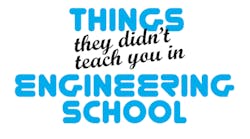First published in the June 27, 1991 issue of Electronic Design
One of the first speakers asked the entire audience of 100-plus teachers, “How many of you built model airplanes when you were young?” To my amazement, about 92% of the people held up their hands. So, he observed that many people who now work in technical electronics were intrigued by building little planes with balsa and glue. These days, I doubt if you would get such a significant show of hands in a classroom, but still I would guess that most electronics engineers now older than 40 once had a hobby of building model planes. So, that’s some of our “roots,” our common heritage, and we wouldn’t have known it if this guy had not asked the question.
Later, there was a panel session on the topic, “What do you look for when you are interviewing a person for a technician’s job?” I observed that I looked for a technician or young engineer that could handle a tricky problem of a type that he (or she) has never seen before. I think that’s more important than to ask a problem of a fundamental type that all students should be able to handle well. I like to ask obscure questions. I like to see what they say when challenged with a question of a sort they have never heard before. I like to hear the gears clashing and grinding inside their heads…
Then another panelist got up to propose that if he is deciding to hire a new engineer or technician, he looks for their ability to do Critical Thinking, because Title 5 of the California Education Code calls for all college students to be subjected to courses in critical thinking. In the simplest sense, Critical Thinking consists of teaching students to be thoughtful and reasoning and to question what they are learning. Does it do any harm to memorize that Napoleon was defeated at Waterloo in 1815? It might seem to do no harm. But, in every student’s schedule, there is only a limited amount of time. If you waste all of your time learning diddly facts like that, you will not learn why things are important. Why did Napoleon get beaten at Waterloo? Why do we measure the CMRR of an op amp the way we do? If a big expensive tester says an op amp has a gain of 88 dB and we measure 112 dB on the best, the expensive tester must be correct, right? Oh, but not necessarily so. If my boss asks me to take some data, but I detect a pattern that indicates something is broken—what do I do if my boss isn’t around to give me advice? When you think of it, a large amount of your learning is involved figuring out what makes sense, and what to do when you come up against contradictions.
When I am hiring a technician or an engineer, I am really interested in hiring a person who has good judgment, and is not afraid to question his data, or even to question me if I ask him to do something that really has an error built into it. One of my readers recently sent me some notes about the Responsibility of the Experimentalist:1
“When doing an experiment, it is important for the experimentalist not to accept the data as correct without adequately questioning it:
- If the data are semi-automatically recorded, then examine the “raw” data closely to determine whether the equipment malfunctioned.
- After recording the data in your notebook, examine the numbers for observational mistakes. Examination of the numbers may also reveal an equipment malfunction that was not previously detected.
- Before making use of the techniques for propagating errors through the various intermediate steps and into the final result, use common sense and ask yourself whether a given experimental result or error is reasonable. If it’s not, there’s an excellent chance that either the equipment malfunctioned or you made an arithmetic or observational mistake (note the distinction between mistake and error). A standard example or a standard test signal may often be available for the experiment or instrumentation to give a known result. You’re urged to devise tests of this sort in order to avoid this kind of mistake.”
So, when you take data, or when you run tests, keep aware of how things make sense, and flag it if things don’t make sense. As Tom Milligan, one of my old production test managers used to tell his test technicians, “If it looks funny, Record Amount of Funny.” We call that “Milligan’s Law,” in his honor.
Now, getting back into Critical Thinking, I found a very good book with that title written by Dr. Richard Paul. Its subtitle read, “What every person needs to survive in a rapidly changing world.” I went out and bought the book, and it makes good reading.2 In addition, the people at the Foundation for Critical Thinking sent me a nice brochure about their 11th Annual International Conference on Critical Thinking coming August 4-7, 1991 at Sonoma State University.3 The brochure said, “A critical education… appeals to reason and evidence. Students should not approach their classes as so many unconnected fields, each with a mass of information to be blindly memorized, but rather as organized systems for thinking clearly, accurately, and precisely about interconnected domains of human life and experience.”
The converse may well be expressed as, “School is going fine… but I’m too busy cramming content into my skull to think about what I read, let alone develop an intelligent view. When do I get to think for myself? Am I condemned to be a memory bank of meaningless words?” Well, I should hope not. The education that I get, that my children get, that my technicians and engineers get, had better consist of a lot of Critical Thinking.
Recently Helen Cage, a furnace operator in National’s Arlington, Texas, plant, was running a special new low-temperature-oxide process. She was reading in the log books that previous operators had been logging in numbers for phosphine flow. She was surprised because she knew this operation did not require phosphine. She contacted Engineering, who investigated and concluded that the phosphine notation must have been some kind of incorrect entry. The next day, Helen was watching the gas-flow indicators on the next run—and the phosphine was flowing. She contacted Engineering again, and insisted that they find out why the phosphine was flowing when it was required to be off. When they searched a little harder, they found some kind of computer error—phosphine was being turned on for all processes, whether they needed it or not. Helen Cage, by refusing to take Yes as an answer, was a hero, because she didn’t believe she should just follow instructions without thinking. I don’t know where Ms. Cage went to school, but she’s the kind of person I want on my team!
All for now. / Comments invited! / RAP / Robert A. Pease / Engineer



